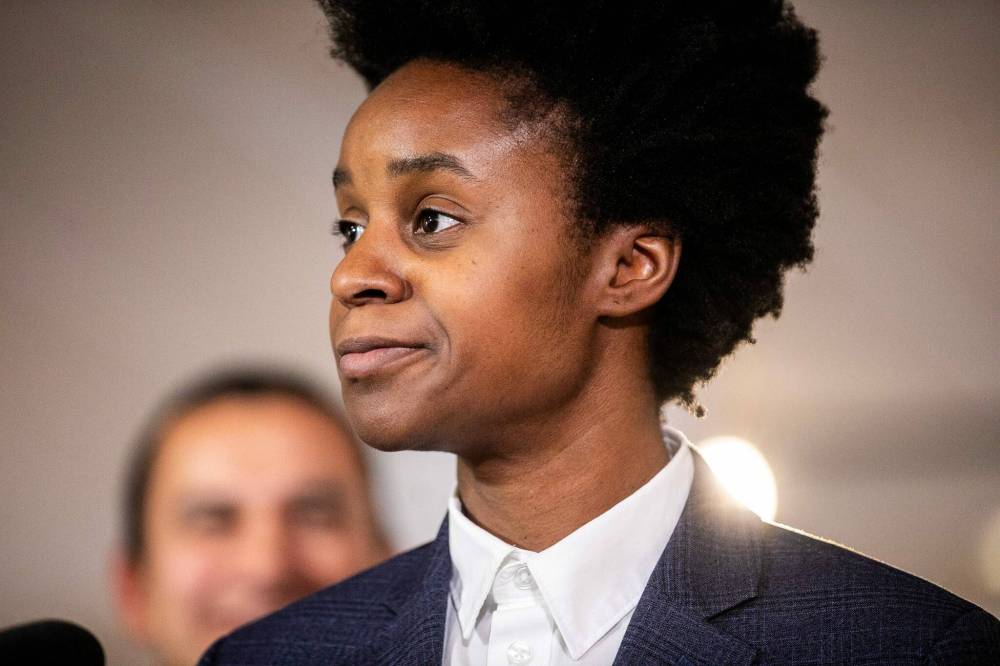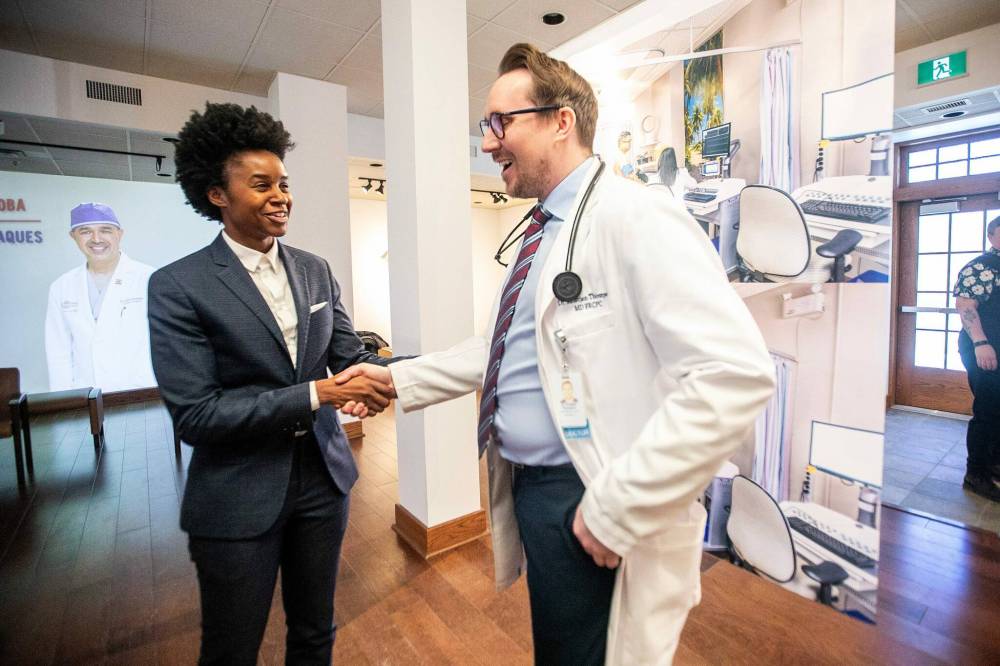Province trumpets 1,255 net new health workers, unions wonder where they are
Read this article for free:
or
Already have an account? Log in here »
To continue reading, please subscribe:
Monthly Digital Subscription
$0 for the first 4 weeks*
- Enjoy unlimited reading on winnipegfreepress.com
- Read the E-Edition, our digital replica newspaper
- Access News Break, our award-winning app
- Play interactive puzzles
*No charge for 4 weeks then price increases to the regular rate of $19.00 plus GST every four weeks. Offer available to new and qualified returning subscribers only. Cancel any time.
Monthly Digital Subscription
$4.75/week*
- Enjoy unlimited reading on winnipegfreepress.com
- Read the E-Edition, our digital replica newspaper
- Access News Break, our award-winning app
- Play interactive puzzles
*Billed as $19 plus GST every four weeks. Cancel any time.
To continue reading, please subscribe:
Add Free Press access to your Brandon Sun subscription for only an additional
$1 for the first 4 weeks*
*Your next subscription payment will increase by $1.00 and you will be charged $16.99 plus GST for four weeks. After four weeks, your payment will increase to $23.99 plus GST every four weeks.
Read unlimited articles for free today:
or
Already have an account? Log in here »
Hey there, time traveller!
This article was published 07/02/2025 (310 days ago), so information in it may no longer be current.
The Kinew government says enticing recent retirees and private-agency employees to return to the public health-care system has resulted in 1,255 net new hires in hospitals across Manitoba.
Provincial officials boasted about surpassing a target in the first NDP budget — a combined 1,000 extra doctors, nurses and other professionals — on Friday, but critics question whether there’s been a noticeable impact on front-line staff or patient care.
“It was a big promise and I’ll be honest, at first, I was a little nervous, but we knew that we had to be ambitious, that Manitobans deserve an ambitious government,” Health Minister Uzoma Asagwara told reporters gathered for a news conference at St. Boniface Hospital.
Asagwara credited the hiring success during the current fiscal year to changes that speed up the certification of internationally educated professionals, an increase in post-secondary health-care training program seats and ensuring all graduates immediately receive a job offer, among other initiatives.’
MIKAELA MACKENZIE / FREE PRESS Health Minister Uzoma Asagwara cited several factors in their hiring success.
Nurses account for 481 of the 1,255 hires — about four in 10 — across Shared Health, CancerCare Manitoba and the five regional health authorities.
Those figures include more than 60 people who have come out of retirement and about 219 who left the private sector for the public system, added Asagwara, who previously worked as a psychiatric nurse.
“Where are they?” said Darlene Jackson, president of the Manitoba Nurses Union. “Because nurses are not seeing the impact of having more nurses in the system.”
For Jackson, the most telling metrics are overtime rates, vacancies and the use of private agencies.
Net new health-care workers, hired between April 1 and Dec. 31, 2024
- Nurses: 481
- Health-care aides: 386
- Allied health workers in diagnostics and other areas: 162
- Physicians: 138
- Residents: 39
- Physician assistants and clinical assistants: 28
- Emergency responders: 14
- Midwives: 7
— Manitoba Health
Claims that overtime has dropped are being paired with reports from members that their managers aren’t filling absences and shift teams are understaffed as a result, she noted.
Jason Linklater, president of the Manitoba Association of Health Care Professionals, echoed those comments, saying there have not been nearly enough additions — only 14 of whom are paramedics — to make a significant impact.
“There’s a disconnect between the government’s numbers and what our members are feeling on the front lines,” Linklater said in a statement on the announcement.
”Right now, there are at least 1,000 vacant allied health positions…. (The province is) not on track to fix health care.”
Asagwara was joined by Premier Wab Kinew, St. Boniface chief medical officer Dr. Kristjan Thompson and other political and health-care worker colleagues for the midday event.
Thompson said new staff members have allowed the facility to increase its internal medicine and critical-care bed numbers and offer both endoscopy procedures and cardiac catheterization (cath labs) on weekends.
“People still have heart attacks on Saturdays and Sundays,” he said. “Before, what we did is we’d have to call folks in, overtime.”
The ER physician said extra hours — as well as moral distress, vicarious trauma and verbal, emotional and physical abuse — are contributing to high levels of burnout.
Thompson celebrated the hiring milestone, as well as new enhancements to security in hospitals being made to support him and his colleagues.
“Our healers need healing, too,” he added.
MIKAELA MACKENZIE / FREE PRESS Dr. Kristjan Thompson, with Asagwara, said new staff members have allowed the facility to increase its internal medicine and critical-care bed numbers and offer both endoscopy procedures and cardiac catheterization (cath labs) on weekends.
Progressive Conservative health critic Kathleen Cook said she’s curious about how the province will reach its goal of recruiting 90 paramedics before the end of the fiscal year and which internal government numbers can back the assertion that mandatory overtime is dropping.
“While new hires are great and needed, we also need to focus on keeping the health-care workers in the system that we do have already,” the Roblin MLA said.
She noted the province highlighted some Tory initiatives, such as the increase in medical school class sizes and the creation of the nursing float pool, for its hiring successes.
Also Friday, the province issued an update on its efforts to appoint more security officers to monitor health-care facilities and install permanent weapons scanners on the Health Sciences Centre campus.
New weapons scanners at HSC
A Canadian artificial intelligence company has won a bid to provide weapons detectors to the province’s largest hospital.
Toronto-based Xtract One Technologies was contracted to install scanners at various Health Sciences Centre entrances, the company announced in a news release Friday.
The release states the equipment “unobtrusively” scans people and their items for “potential mass casualty weapons” while distinguishing these threats from tablets, keys and other harmless objects that enter a facility.
A Canadian artificial intelligence company has won a bid to provide weapons detectors to the province’s largest hospital.
Toronto-based Xtract One Technologies was contracted to install scanners at various Health Sciences Centre entrances, the company announced in a news release Friday.
The release states the equipment “unobtrusively” scans people and their items for “potential mass casualty weapons” while distinguishing these threats from tablets, keys and other harmless objects that enter a facility.
“Health-care environments today face two security challenges: providing top-tier security while ensuring that both patients and caregivers feel safe and comfortable,” Peter Evans, CEO of Xtract One, said in a statement.
“This is a trend we’re seeing across the health-care sector, where providers are actively looking for solutions to these growing challenges, and we welcome the opportunity to play a role in securing health facility environments.”
HSC’s adult and children’s emergency departments and Crisis Response Centre will be equipped with the devices.
Xtract One Technologies indicated its security equipment is designed to allow seamless passage through checkpoints and reduce the need for separate bag searches.
Manitoba’s health minister said a total of 96 institutional safety officers have been trained and assigned to various health-care facilities since last spring to bolster security. The target for a “full complement” is 126.
HSC is home to the largest roster, with 42 appointees at present. Victoria General Hospital, Brandon Regional Health Centre and St. Boniface Hospital each have 16 officers. The remaining six are stationed at Selkirk Mental Health Centre.
— Scott Billeck
The latter project, which involves the adult and children’s ERs and Crisis Response Centre, is anticipated to be complete by Feb. 13.
“I’ve been hit. I’ve had things thrown at me; no weapons have been pulled on me, but I’ve seen them when we’ve had to help a patient in a bed, there’s been a knife in their pocket or a machete. There’s a huge impact, mentally,” said Belinda Wong, a veteran health-care aide at HSC.
Wong cited violent incidents as the reason she left her job in the HSC emergency room in 2019.
Members of the public are encouraged to use free “amnesty lockers” to store personal items, including contraband, during a visit to the site. In her experience, few people take up the offer, said Wong, now an employee of the HSC Pain Clinic.
Among recent high-profile incidents, a concealed weapon was found on a person acting suspiciously in the children’s ER in the fall and an HSC security guard was stabbed by a patient last winter.
Margaret Schroeder, president of Canadian Union of Public Employees Local 204, said her members have been asking for scanners and an increased security presence “for a very long time.”
Support services staff are hopeful scanners will be installed at more hospitals, Schroeder said.
Jackson said nurses want stronger legislation in place to deter criminals from attacking health-care workers on the job. As far as she’s concerned, anyone who assaults a nurse should face the same consequences as people who are convicted of striking a police officer.
Sixty-six per cent of HSC nurses who participated in a November 2024 “Grade Your Government” survey indicated they had seen some improvement in their employer’s efforts to keep them safe while arriving to and leaving from work over the last year.
However, only 36 per cent of these employees disclosed to their union that they had noticed a positive change in their employer’s efforts to address violence and verbal abuse on the job during the same period.
maggie.macintosh@freepress.mb.ca

Maggie Macintosh
Education reporter
Maggie Macintosh reports on education for the Free Press. Originally from Hamilton, Ont., she first reported for the Free Press in 2017. Read more about Maggie.
Funding for the Free Press education reporter comes from the Government of Canada through the Local Journalism Initiative.
Every piece of reporting Maggie produces is reviewed by an editing team before it is posted online or published in print — part of the Free Press‘s tradition, since 1872, of producing reliable independent journalism. Read more about Free Press’s history and mandate, and learn how our newsroom operates.
Our newsroom depends on a growing audience of readers to power our journalism. If you are not a paid reader, please consider becoming a subscriber.
Our newsroom depends on its audience of readers to power our journalism. Thank you for your support.
History
Updated on Friday, February 7, 2025 6:08 PM CST: Full write-thru with detail and comments on the government saying there have been 1,255 net new hires in hospitals across Manitoba.



